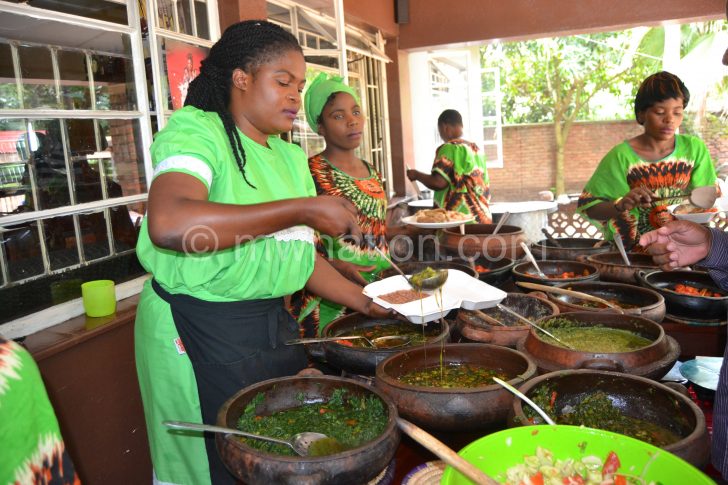Traditional food takeover
For long the ultimate idea for a meal away from home has been a visit to some fancy uptown restaurant, where exotic food, which is mostly junk, is the order of the day.
Shifting perceptions and demands of trying to eat and maintain a healthy lifestyle seem to be ushering a new understanding when it comes to people’s choice of food and how it is prepared.

The unique traditional cuisine that is offered at Pamudzi Bar and Eatery has clearly struck the chord of so many people around the city of Blantyre. From noon up until around pm, the place is a beehive of activities as cars are continuously coming in and going out.
Situated in Mandala, the place which looked at from a-far seems ordinary, oozes a special traditional appeal. From the dressing of the handlers, to the naming of the eating shelters, everything retains a distinct traditional feel.
Food is served at the khonde from the main house, kwa mbuya by a group of female staff who are draped in their traditional chilundu regalia complete with a head cloth (duku). Patrons can either chose to enjoy their meal in mphala, pabwalo and gowelo shelters.
“In a typical village setting we have these three structures present. I pictured a situation where someone upon being served his food, depending on how one is feeling can make a decision to enjoy his food in either of these places,” says owner of the place Loveness Msanide.
But where did Msanide get the ideas to go this route and where does she derive her inspiration?
“I grew up in my home village in Linthipe in Dedza district. When I was starting my business in 2015 memories of what I was eating during my stay in the village flooded my mind. My simple research showed that there is no place within town which offers such food.
“But the beginning was not that easy. I remember depressing moments when people would come, open our pots and leave without buying. They said I was doing something so backward and dirty. I almost gave up but something within told me to hold on to this dream,” she says.
Through leaps and bounds the popularity of the place has grown and Pamudzi has become a second home to many. Msanide started with three support staff but now she has employed 12 workers.
A visit to the place will almost surprise you with its menu. Chisoso, mwamuna ali mgone, therere of all types, mfutso, mushroom (bowa), bonongwe, mkhwani and luni form the vegetable category.
They offer a variety of fish ranging from milamba to sanjika, which is famous in Nkhotakota and some parts of Monkey Bay, matemba a Domasi and makakana. They also have dzitete (grasshoppers) on their menu.
“I am in the process of identifying someone to be supplying us with gwape meat,” she reveals.
The chicken, goat meat and beef is just boiled.
“And all this food is prepared using clay pots without the use of cooking oil save for rice and some who upon request ask us to cook their meal using oil,” says Msanide.
In an era where people have become so watchful with what they eat and some driven by the need to observe good health habits considering their medical conditions, it is with little wonder that the place is proving a big hit.
But for some, the traditionally prepared dishes offer them the opportunity to reconnect with their cultures and regain their traditional tastes. Tastes of meals they have forgotten and some which is rarely served in their homes or never at all.
Innocent Kamdamanja, a Blantyre resident from Naperi is a regular customer at Pamudzi.
He says the local recipe at Pamudzi caters for the tastes of anyone who calls himself a Malawian.
“The setup tells the whole story about the Malawian culture. It is a direct attempt from the owners to preserve our culture and remind everyone who comes to eat of who we are and where we come from,” says Kamdamanja as he enjoys a glass of thobwa.
Anthony Mavuto Gunde, lecturer in Media, Communication and Cultural Studies at Chancellor College says the concept undertaken at Pamudzi is a culture that Malawians should embrace, celebrate and promote.
“With globalisation some of our traditional values are losing out to cultural imperialism from the West and what we eat is one of them. The Afrocentric view at this place is expressing how we ought to restore and preserve our identity as Africans and more so as Malawians,” Gunde says.
He has blamed the media for being at the centre stage of promoting unhealthy lifestyles by magnifying Western fast-food restaurants.
Despite the place combining a bar and restaurant in one place, Pamudzi’s growing popularity is hinging more on what is carried on its food menu than anything else. The courage shown by the owners to deviate from the norm seems to have won them the day.





